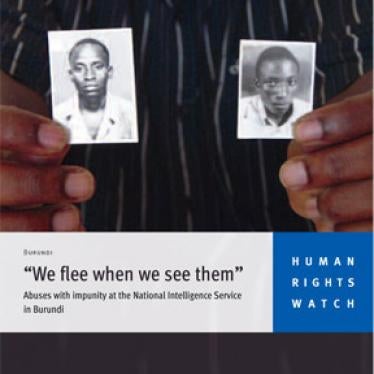The government of Burundi must bring to justice members of the national intelligence service (SNR) at all levels of the chain of command responsible for serious rights abuses, Human Rights Watch said in a report released today. Over the past year, SNR agents have been implicated in at least 38 extrajudicial executions and more than 200 arbitrary arrests, some involving torture.
“Since the new government took office, the intelligence service has been free to use any means necessary, including killing and torture, to reach its goals,” said Alison Des Forges, senior Africa advisor at Human Rights Watch. “The government must address this pattern of continuing violations.”
The 33-page report, “‘We flee when we see them’: Abuses with Impunity by the Burundi National Intelligence Service,” documents five incidents of extrajudicial executions, as well as instances of torture and arbitrary detention. Some detainees were beaten with batons until they lost consciousness. In one case, a detainee has been held for over 11 months in the SNR detention facilities without charge.
Many incidents of torture and extrajudicial execution allegedly involving SNR agents have gone unaddressed by government authorities. However, in two particularly egregious cases, SNR agents have been arrested and investigations are reportedly underway. The first involves an SNR agent who allegedly participated in the “disappearance” and presumed murder of some 30 people in Muyinga province in July and August 2006. The second involves a man formally affiliated with the SNR who allegedly killed four men held in state custody. No one has yet been tried for these crimes.
“The arrest of two suspects is promising,” said Des Forges. “But it’s now up to the police and judicial authorities to conduct vigorous investigations and prosecute all of those implicated to the full extent of the law.”
Background
Burundi passed a law establishing the Service National de Renseignement (SNR) out of the former Documentation Nationale in March 2006. The head of the SNR reports directly to the president and there is no independent oversight of intelligence activities. Human rights monitors from non-governmental organizations and the United Nations Operation in Burundi have rarely been permitted access to detainees held in SNR detention facilities.
After more than a decade of civil war in Burundi, the largest rebel group, the National Council for the Defense of Democracy-Forces for the Defense of Democracy (Conseil national pour la défense de la démocratie-Forces pour la défense de la démocratie, CNDD-FDD) won elections in 2005 and took power under the leadership of a new national president, Pierre Nkurunziza. The SNR has often presented its activities as necessary to counter threats from the National Liberation Forces (Forces Nationales pour la Liberation, FNL), the last rebel groups in armed opposition to the government. On September 7, 2006 the government and the FNL signed a ceasefire agreement.







